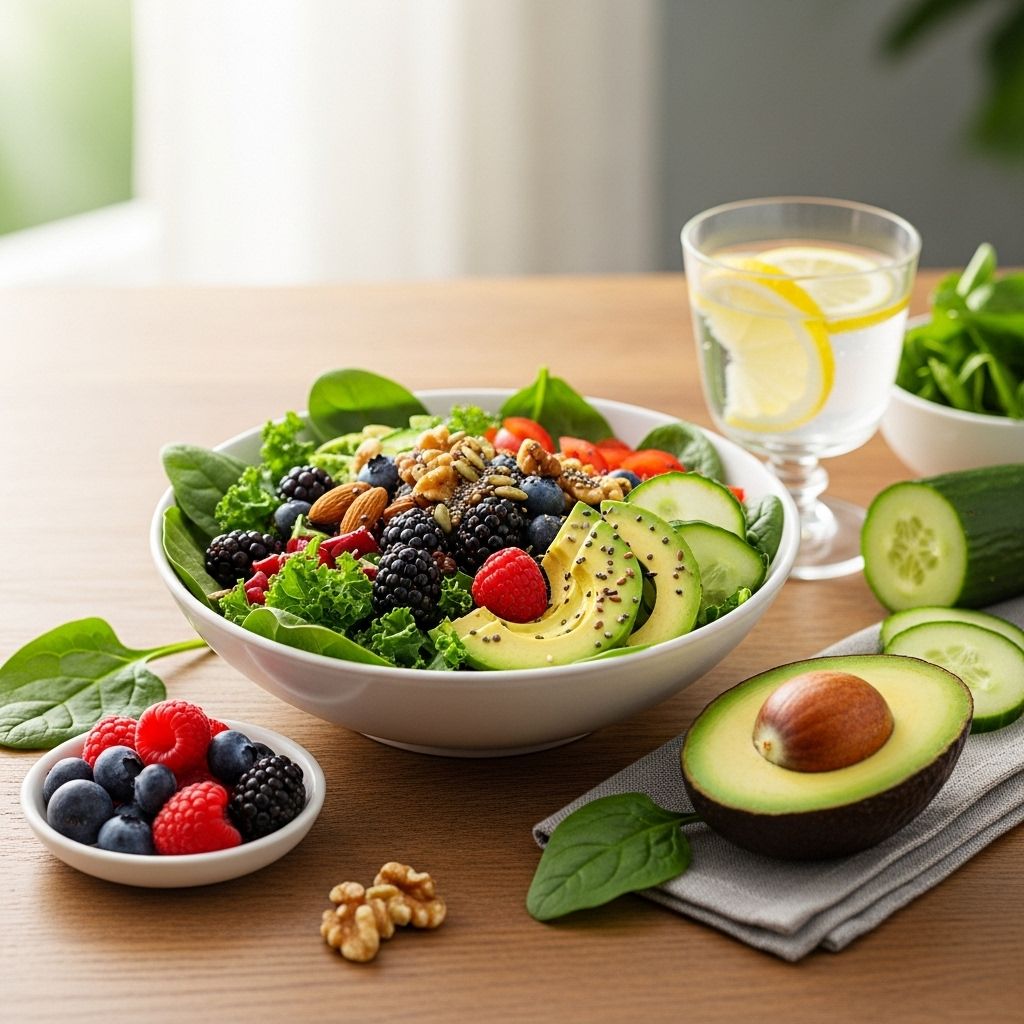Diet for Better Skin Circulation: 7 Changes in 30 Days
Daily nutrient-packed meals fuel a luminous complexion by improving blood flow.

Introduction to Skin Circulation and Diet
Diet plays a crucial role in maintaining healthy skin circulation. A balanced intake of nutrients can enhance blood flow to the skin, reducing the appearance of aging and improving overall health. This article outlines seven dietary changes that can improve skin circulation over a month.
Table of Contents
- Why Diet Matters for Skin Circulation
- 7 Dietary Changes for Better Skin Circulation
- Beneficial Nutrients for Skin Circulation
- Frequently Asked Questions (FAQs)
Why Diet Matters for Skin Circulation
A diet rich in essential nutrients supports the health and integrity of the skin. Key components like omega-3 fatty acids, vitamin C, and antioxidants help maintain skin elasticity and reduce inflammation, which is vital for proper circulation.
Key Nutritional Elements for Skin Circulation:
- Omega-3 Fatty Acids: Found in fatty fish like salmon and mackerel, these fats reduce inflammation and improve skin suppleness.
- Vitamin C: Essential for collagen production and protecting skin from oxidative stress, vitamin C is abundant in fruits like strawberries and citrus.
- Antioxidants: Compounds like vitamin E and beta-carotene help protect the skin from environmental damage and promote healthy aging.
7 Dietary Changes for Better Skin Circulation
Here are seven simple dietary adjustments to enhance skin circulation over a 30-day period:
1. Increase Omega-3 Rich Foods
Incorporate fatty fish (salmon, mackerel) into your meals two to three times a week. Omega-3 fatty acids support skin health by reducing inflammation and maintaining skin moisture.
2. Eat More Avocados
Avocados are rich in healthy fats, vitamin C, and vitamin E, which are excellent for skin hydration and protection. Consume one avocado daily.
3. Include Fresh Fruits and Vegetables
Ensure your diet includes a variety of fruits and vegetables, such as tomatoes (rich in vitamin C and lycopene) and leafy greens (rich in antioxidants and vitamin A).
4. Add Nuts and Seeds
Walnuts and sunflower seeds provide essential fatty acids and antioxidants, supporting skin repair and protection.
5. Choose Antioxidant-Rich Foods
Dark chocolate with at least 70% cocoa is rich in antioxidants, helping protect the skin from oxidative damage. Consume a small amount daily.
6. Stay Hydrated
Adequate hydration is crucial for maintaining skin circulation. Aim for at least 8 glasses of water per day.
7. Incorporate Probiotic Foods
Probiotics support gut health, which is linked to improved skin health. Include probiotic-rich foods like yogurt or kefir in your diet.
Beneficial Nutrients for Skin Circulation
Beyond the dietary changes, understanding the nutritional components beneficial for skin circulation is essential:
Key Nutrients for Healthy Skin:
- Vitamin E: Acts as an antioxidant, protecting the skin from damage and promoting a youthful appearance.
- Iron: Crucial for transporting oxygen to skin cells, contributing to a healthy complexion.
- Zinc: Important for wound healing and maintaining skin integrity.
Frequently Asked Questions (FAQs)
Q: How Does Diet Influence Skin Circulation?
A: Diet plays a significant role in maintaining healthy skin circulation by providing essential nutrients that support skin health and reduce inflammation.
Q: What Are the Best Foods for Skin Circulation?
A: Foods rich in omega-3 fatty acids (like salmon), healthy fats (avocados), and antioxidants (dark chocolate) are beneficial for improving skin circulation.
Q: How Long Does It Take to See Improvements in Skin Circulation?
A: Improvements in skin circulation can start to be noticeable within a few weeks of consistent dietary changes, but significant results may take about 30 days.
Q: Are There Any Supplements That Can Help?
A: While supplements like fish oil capsules can support skin health, it is advisable to consult a healthcare professional before adding any supplements to your diet.
Q: How Important Is Hydration for Skin Circulation?
A: Adequate hydration is crucial for maintaining healthy skin circulation, as water helps in transporting nutrients and oxygen to skin cells.
References
- https://www.healthline.com/nutrition/12-foods-for-healthy-skin
- https://www.myconfidencelab.com/bestie-blog/nutrition-and-skin-health
- https://www.bswhealth.com/blog/eat-your-way-to-glowing-skin-with-these-6-vitamins-and-nutrients
- https://www.bda.uk.com/resource/skin-health.html
- https://pmc.ncbi.nlm.nih.gov/articles/PMC7146365/
- https://www.mayoclinic.org/healthy-lifestyle/adult-health/in-depth/skin-care/art-20048237
- https://www.goodhousekeeping.com/health/diet-nutrition/g65962713/best-foods-for-healthy-glowing-skin-at-any-age/
- https://pmc.ncbi.nlm.nih.gov/articles/PMC11723311/
- https://www.webmd.com/dvt/ss/slideshow-foods-for-circulation
Read full bio of Sneha Tete












